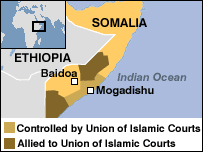BBC NEWS
Friday, July 07, 2006
Ethiopian troops will not form part of a possible peacekeeping force in Somalia, a diplomat has told the BBC.
Kenya’s ambassador to Somalia Mohammed Affey said that any troops would only come from Sudan and Uganda. He was speaking after talks in Mogadishu.
Somalia’s weak, UN-backed government wants foreign troops to be deployed.
‘Misunderstanding’
Mr Affey also said that the proposed peacekeeping force would not be disarming Somali militias.
“There is clearly a lot of misunderstanding about the role of the troops,” he told the BBC’s Network Africa programme.
He said they would help the government rebuild security structures.
Somalia has not had an effective national government in 15 years.
The question of foreign peacekeepers is one of the key issues set to be discussed when the Islamists and the government hold talks on 15 July in Sudan.
“We believe that alien forces are both unnecessary and counterproductive,” leaders of the Supreme Islamic Courts Council said in a written statement distributed to Mr Affey and other diplomats from the African Union, the Arab League and East Africa’s regional body, Igad, in Mogadishu on Thursday.
“The Somali problem is a political one, and cannot be resolved by military means,” the statement said.
Border war
The Union of Islamic Courts (UIC) says it opposes any foreign troops but Ethiopia’s possible involvement is most controversial.
Ethiopia and Somalia fought a border war in the 1970s, which Ethiopia won.
 |
In the 1990s, Ethiopia helped President Abdullahi Yusuf defeat an Islamist militia led by one of the UIC’s leaders, Sheikh Hassan Dahir Aweys.
Mr Affey said that even in the second stage of a possible peace mission, the “frontline states” – Ethiopia, Kenya and Djibouti – would only be involved in logistics.
“If troops have to come in, they will come from Uganda and Sudan.”
However, a Ugandan army spokesman has said no troops would be deployed until it is safe to do so.
Source: BBC NEWS, July 7, 2006






